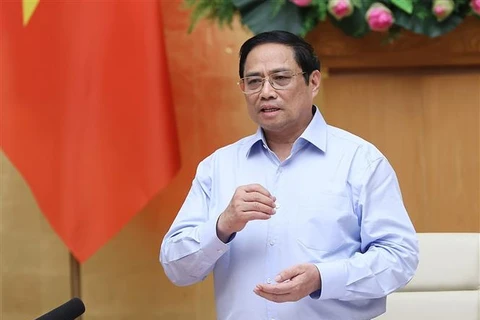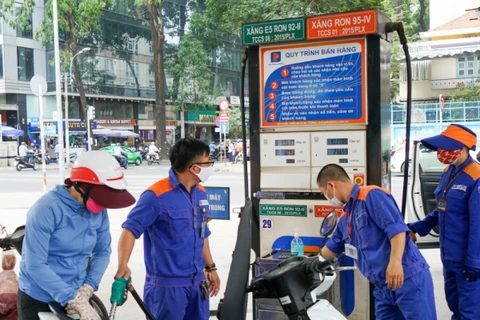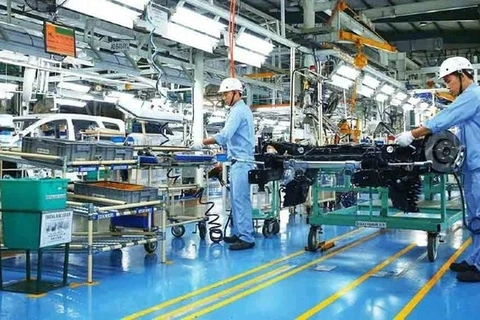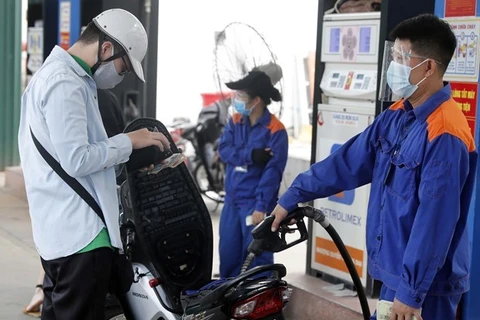 Prime Minister Pham Minh Chinh chairs a working session on July 30 with ministries, sectors and agencies to brainstorm over a draft plan to ensure macro-economic stability, curb inflation, prevent contraction, and ensure major balances of the economy. (Photo: VietnamPlus)
Prime Minister Pham Minh Chinh chairs a working session on July 30 with ministries, sectors and agencies to brainstorm over a draft plan to ensure macro-economic stability, curb inflation, prevent contraction, and ensure major balances of the economy. (Photo: VietnamPlus) Hanoi (VNA) – Pressures on the economy will increase in the remaining months of 2022, especially as escalating fuel and material prices and rebounding domestic consumption place pressure squarely on inflation and production costs.
So said Deputy Minister of Planning and Investment Tran Quoc Phuong at a working session on July 30 between Prime Minister Pham Minh Chinh and ministries, sectors, agencies, experts, and some international organisations to collect opinions on a draft plan to ensure macro-economic stability. The plan is to curb inflation, prevent contraction, and ensure major balances of the economy.
Signs of decelerating investment in production
The General Statistics Office reported that in the first half of 2022, the Vietnamese economy expanded 6.42% compared to the same period last year, faster than expected. Inflation has stayed under control with the seven-month consumer price index (CPI), up by only 2.54% year on year, while inflation in many countries has hit a 40-year high. The State budget collection reached 77.5% of this year’s target.
However, Phuong held that difficulties and challenges may increase in the latter half.
Price hike pressure will mount as external inflation impacts domestic production activities in both agriculture and industry. The most worrying thing is that some farmers have curbed their cultivation due to higher fertiliser and animal feed prices.
Besides, industrial production is also facing obstacles as material prices and transportation costs are up. The sudden surge in building material prices has also affected the progress of public investment disbursement at key projects as contractors are finding ways to wait for prices to cool down before moving forward with construction.
Phuong noted from the year’s beginning to July 31, the public investment disbursement approximated only 34.5% of the target set by the PM, lower than the 36.7% recorded last year (36.7%).
In addition, complex developments of the COVID-19 pandemic with the coming into being of new variants, the Influenza A outbreak, and the possible entry of monkeypox may add further difficulties to domestic production and supply - demand balancing efforts, he added.
Economic growth targeted at about 7%
The official said it is necessary to work out more solutions to prevent production contraction, especially in agriculture, and boost economic sectors. This year, the economic growth is targeted at about 7%, inflation at under 4%, and credit growth at some 14%.
The Ministry of Planning and Investment called for fast, effective, substantive, and comprehensive implementation of short-term tasks and solutions. These are identified in the Government’s Resolution No 01/NQ-CP, the socio-economic recovery and development programme, and the COVID-19 prevention and control programme for 2022 - 2023, along with measures aiding economic growth in the medium and long terms.
In the short term, it is important to ready flexible and timely plans to respond to all circumstances. It is also critical to keep the macro-economy and major balances stable, and devise measures for assisting businesses and people, especially low-income earners, in the face of rising prices, production expenses, and costs of living, Phuong said.
He also underlined the importance of flexible and harmonious combination of fiscal and monetary policies. This means the State Bank of Vietnam and the Ministry of Finance must keep a close watch on the domestic situation and coordinate with relevant agencies to make timely, effective and appropriate policy response.
Ministries and agencies need to make proactive and flexible moves instead of waiting for directions from the Government and the PM or recommendations from other agencies, the Deputy Minister added./.
























